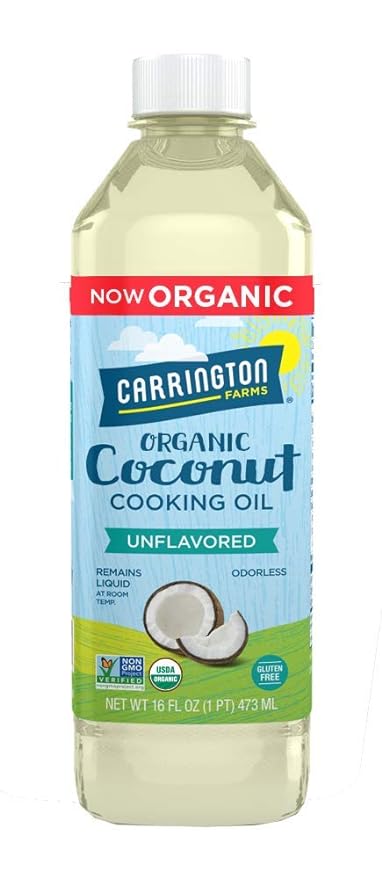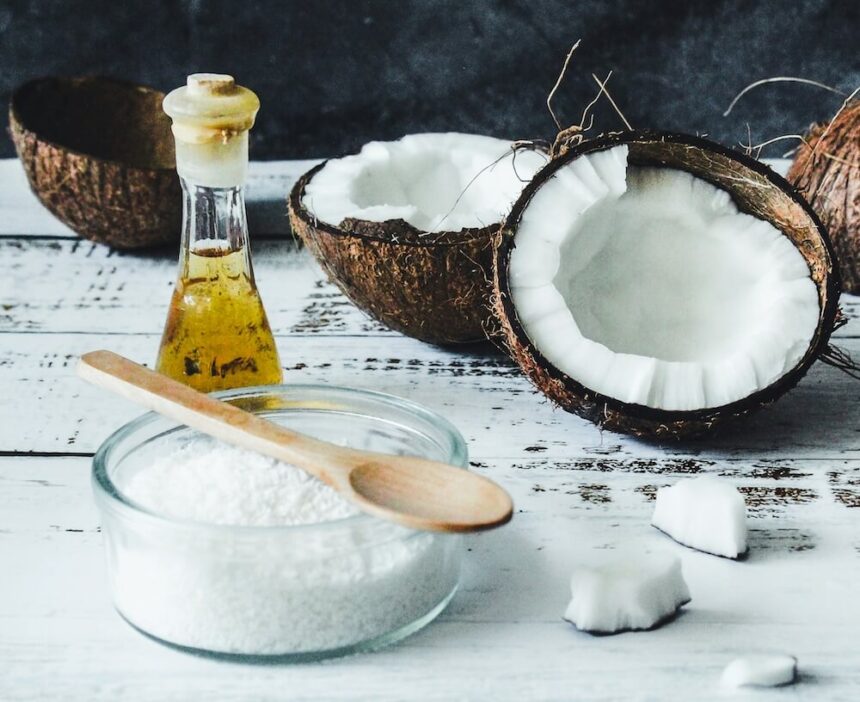Coconut oil is now a staple in household kitchens across the country. It’s touted as a superfood and a panacea for various health concerns.
Coconut oil benefits may be vast, but before you run to the store, there are some things you should know about this tropical oil.
The Distinct Smell and Flavor of Coconut Oil
Some oils are generally flavorless or have a mild flavor, like sunflower seed oil or grapeseed oil.
Sometimes, olive oil can have a distinct flavor profile, depending on the variety you purchase.
But you will never confuse unrefined coconut oil with any other oil. It has an unmistakable flavor. This can be an issue for some people who don’t want to taste coconut in their scrambled eggs or sautéed vegetables despite all the benefits of eating coconut oil.
The Caloric Density of Coconut Oil
Since coconut oil is, well, an oil, it makes sense that it will have considerable fat content, just like most other oils on the market today. You might want to be very generous with your coconut oil consumption because of all the health benefits of coconut oil you’ve learned about.
But consuming large amounts of coconut oil can increase your caloric intake. This can be problematic if you don’t have an active lifestyle or a balanced diet. And this can lead to weight gain.
Coconut Oil Is Solid
This quality isn’t necessarily bad, but it can be inconvenient working with solid oil in the kitchen. Due to its fat particles, coconut oil is solid at room temperature, and it can be annoying trying to get oil from the jar.
To have accessible oil on hand, you can keep your jar near your stovetop or any other warm place where it won’t solidify. You can also place boiled water in a bowl and place the solidified coconut oil in a smaller bowl on top of the warm water. The coconut oil will slowly melt into a liquid state.
This is much more helpful when cooking and baking with it.
Coconut Oil Increases Good Cholesterol
Coconut oil is high in saturated fats, which scares some people away. 90% of its fat is saturated fat. Compare this to olive oil, which contains only 10% saturated fat!
But not all saturated fat is equal.
In fact, coconut contains a fatty acid called lauric acid, and this actually increases HDL. This is the good cholesterol you want more of. If you’re wondering, ‘is coconut oil good for you?’, then lauric acid is, in fact, responsible for most of the coconut oil benefits – and great benefits at that.
Coconut Oil Helps You Lose Weight
Coconut oil benefits also include weight-loss, since it has a positive effect on your metabolism.
Coconut oil is made up of medium-chain triglycerides (MCT), and your body uses this type of fat for energy instead of storing it away as a backup source of energy.
In short, your body is less likely to take the energy from coconut oil and store it as unwanted body fat.
Coconut Oil Is Safer at Higher Heats
Coconut oil is an ideal oil to use for cooking because it can stand up to high heats. Now, you’re probably thinking that most oils can tolerate high temperatures since we always use other oils.
But due to the fat structures in coconut oil, it’s not as susceptible to oxidation when it’s heated to high temperatures.
Why should you avoid eating oxidized oil?
Well, when certain oils are overheated, they are exposed to oxygen. This causes the oil to go rancid, and rancid oil is harmful to your health. It can contribute to vascular problems, like heart disease or even breast cancer.
How to Find Good Quality Coconut Oil
Just like any other fatty food, it’s important to consume coconut oil in moderation and to use the best quality you can find.
Marketing and labeling can be confusing because it’s quite a trendy oil. Here are some basic tips to keep in mind when you’re out grocery shopping.
If you’re looking to buy coconut oil for cooking, then Carrington Farms liquid coconut cooking oil may be a good choice.

Carrington Farms Liquid Coconut Cooking oil
– Gluten free, hexane free, and NON-GMO Project Verified
– Great for medium to high heat cooking
– Naturally rich in Medium Chain Triglycerides MCT
– Carrington Farms liquid coconut cooking oil comes from only the finest coconuts in the Philippines
Difference Between Virgin and Extra-Virgin Coconut Oil
To be honest, there’s not much difference between these two oils.
The terms, “virgin” and “extra-virgin” originated with olive oils, and that’s because there is a distinct difference between certain virgin and extra-virgin olive oils.
Extra virgin olive oil is the oil taken from the first pressing of olives. But virgin and extra-virgin coconut oils are generally identical since many manufacturers jar their coconut oil after the first pressing anyway.
So, there’s really no advantage between virgin and extra-virgin coconut oil.
Should You Buy Expeller-Pressed or Cold-Pressed Coconut Oil?
Expeller-pressed just refers to the most basic process of obtaining oil from the coconut.
But if coconut oil is cold-pressed, that means the temperature didn’t exceed 140°F during the extraction process. Because cold-pressed coconut oil is less processed, some people consider it to be a purer form of oil.
The Difference Between Refined and Unrefined Coconut Oil
If you don’t like the taste of coconut but want to take advantage of all the health benefits of coconut oil, opt for refined coconut oil. It has a mild flavor and can stand up to high heats (up to 400°F).
Otherwise, you can use unrefined coconut oil, which tastes tropical and almost nutty. Just remember that unrefined coconut oil can be safely heated up to 350°F.
Cooking With Coconut Oil
Coconut oil uses are versatile, to say the least. If you want to use it in baking, you may want to use refined coconut oil. This way, you won’t taste any unwanted tropical flavors in your brownies!
Another important tip to remember when baking with coconut oil is to always follow recipes made specifically for coconut oil.
It’s a great substitute for butter, but since the water content differs, it’s not always a good idea to simply substitute it. It’s better to use recipes that are designed for coconut oil.
Refined coconut oil is a wonderful way to sauté and sear vegetables and meat. If you’re preparing Asian recipes, you might want to use unrefined coconut oil since it’s distinct flavor is quite fitting in these cuisines.
Because refined coconut oil can safely withstand high temperatures, it’s an excellent oil for both shallow and deep frying. It’s a healthier way to enjoy fish fries, French fries, and even homemade donuts! As you can see, there are more than plenty uses for coconut oil.
Coconut oil is a wonderful staple for your kitchen. When used appropriately and in moderation, you can give all your recipes a nice nutritional boost.








